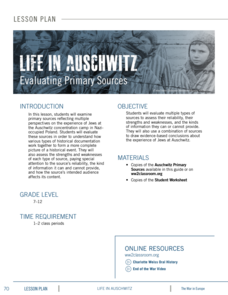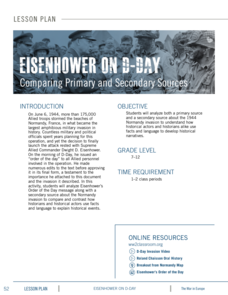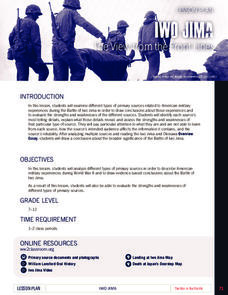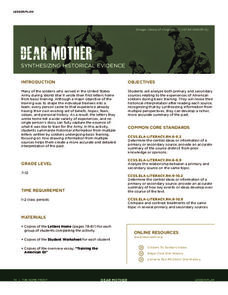National WWII Museum
On Leave in Paris: Maps as Primary Sources
Primary sources—even those that seem mundane—offer a window into those who experienced history. Using a Red Cross map offered to soldiers stationed in Paris after World War II alongside worksheet questions, scholars consider what life...
National WWII Museum
Life in Auschwitz: Evaluating Primary Sources
Historians explain what happened during the Holocaust, but only primary sources portray the true horror of places such as Auschwitz. Using accounts from those who survived the camps, as well as a Nazi government official's memoirs, class...
Civil War Trust
Civil War Photography: Photography as a Primary Source
Can we learn a thing or two about history by looking at pictures from the past? As young historians view 2-D and 3-D primary source photographs, they respond to a series of worksheets that guides them toward unveiling clues...
The New York Times
Teaching the Vietnam War with Primary Sources from the New York Times
Use the New York Times database of primary sources to teach a unit on the Vietnam War. The resource consists of a variety of primary sources as well as a lesson plan showcasing how to teach a lesson using them. Pupils analyze the...
Humanities Texas
Primary Source Worksheet: Letter Regarding the Whiskey Rebellion
Analyze the federal government's direct response to the Whiskey Rebellion through this fantastic primary source analysis activity activity.
Humanities Texas
Primary Source Worksheet: “Report on Manufacturers,” Annals of Congress
Invite your learners to take a look at life during the term of United States president George Washington through analysis of an interesting primary source. The document summarizes American manufacturing capacities, as detailed...
Humanities Texas
Primary Source Worksheet: Abraham Lincoln, Draft of the Gettysburg Address
Young historians closely examine the words of Abraham Lincoln's Gettysburg Address with this primary source analysis worksheet.
National WWII Museum
Eisenhower on D-Day: Comparing Primary and Secondary Sources
Dwight D. Eisenhower's message to troops for D-Day is iconic. Individuals examine Eisenhower's words and compare that to historians' understanding of the epic events of that day using primary sources, an essay, and a Venn diagram to...
Center for History Education
Was the Stamp Act Fair?
Pledge your loyalty to the king and the Stamp Act or sign an oath against the tax. After simulating an in-class tax for school supplies, young historians consider the reasons for the Stamp Act and similar colonial policies. The...
Humanities Texas
Primary Source Worksheet: Thomas Jefferson, Message to Congress Concerning Louisiana
Proficient reading of informational text, especially primary source documents, requires practice. This message from Thomas Jefferson about the Louisiana Purchase offers readers a chance to develop these comprehension skills.
EngageNY
Mid-Unit Assessment: Classifying and Evaluating Primary Sources
Let's go for a walk. Learners complete the mid-unit assessment by completing a gallery walk to analyze different primary sources discussed while reading A Mighty Long Way. After viewing the sources, class members complete organizers and...
Humanities Texas
Primary Source Worksheet: Excerpt from Reagan's Speech to the National Association of Evangelicals
Ronald Reagan's 1983 speech to the National Association of Evangelicals (also know as the "Evil Empire Speech") offers readers with an opportunity to practice their skills at reading informational text, specifically primary source...
Humanities Texas
Primary Source Worksheet: Abraham Lincoln, Letter to Horace Greeley
Through close analysis of a primary source document and discussion questions, learners gain great insight into how Abraham Lincoln viewed his duties as president of the United States, as well as his response to those who criticized...
Humanities Texas
Primary Source Worksheet: Ronald Reagan, Excerpt from Reagan's First Inaugural Address
A key challenge in teaching kids how to read informational text, particularly primary source documents, is finding suitable resources and then developing questions that guide readers. Never fear, help is here in the form of a series...
Center for History Education
How Did the Public View Women’s Contributions to the Revolutionary War Effort?
Calling upon the legacies of Joan of Arc, Elizabeth I, and Catherine the Great, Esther Reed rallied Southern women to support the American Revolution. Using a broadside by Reed and other primary sources, such as poetry, young historians...
Humanities Texas
Primary Source Worksheet: Grant E. Hamilton, “I Rather Like That Imported Affair”
Political cartoons are primary source documents and learning to read them can be a challenge. Challenge the reading skills of your class with a political cartoon featuring rough and ready, Teddy Roosevelt.
Humanities Texas
Primary Source Worksheet: Udo J. Keppler, “Next!”
Standard Oil's stranglehold on the US government is the subject of a 1904 political cartoon. Kids use the questions on the provided worksheet to prompt their analysis of this primary source.
Humanities Texas
Primary Source Worksheet: Theodore Roosevelt, Excerpt from “The Square Deal” Speech
Talk about a timely resource! As part of a series of primary source exercises, individuals read and respond to questions about Theodore Roosevelt's "The Square Deal" speech. Roosevelt reminds us of what our social system should be.
Humanities Texas
Primary Source Worksheet: Franklin D. Roosevelt, Excerpts from Fireside Chat on Economic Conditions
Franklin D. Roosevelt's April 14, 1938 Fireside Chat on economic conditions provides young historians an opportunity to polish their primary source comprehension skills. A great resource to add to you curriculum library.
Humanities Texas
Primary Source Worksheet: Franklin D. Roosevelt, First Inaugural Address
Young historians will learn not to fear primary source materials (or fear itself, for that matter) thanks to this resource that uses Franklin D. Roosevelt's March 4, 1933 Inaugural Address to model how to conduct a close reading of such...
Historical Thinking Matters
Rosa Parks: 5 Day Lesson
What led to the success of the Montgomery Bus Boycott, and how might historians approach this question differently? This rich series of lessons includes a short introductory video clip, analysis of six primary source documents, and...
National WWII Museum
Iwo Jima: The View from the Front Lines
Iwo Jima was the site of some of the most grim fighting in World War II. Learners consider this fact while examining primary sources, including letters home, from those on the front lines. After they complete the analysis, scholars then...
National WWII Museum
Dear Mother: Synthesizing Historical Evidence
It's one thing to read history, it's another to live it. Pupils examine secondary and primary sources that detail the training of soldiers before deployment. Then, they consider the impact of primary sources on how they understand the...
New York State Education Department
Global History and Geography Examination: June 2011
People in Ukraine, Rwanda, and Cambodia have all faced challenges to their human rights and even genocide. Using primary and secondary sources, scholars evaluate these challenges and the international community's role in them. The...
Other popular searches
- Primary Source Documents
- Using Primary Sources
- Primary Source Analysis
- Wwi, Primary Sources
- Rosa Parks Primary Documents
- Gilded Age Primary Sources
- Working With Primary Sources
- Primary Resources Hsie
- Web Quests Primary Sources
- Ancient Rome Primary Sources
- 1920 1929 Primary Sources
- Primary Sources and Family























